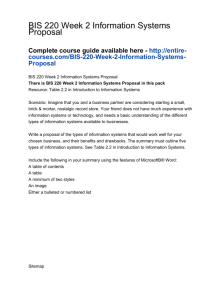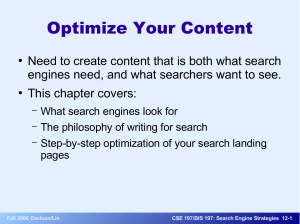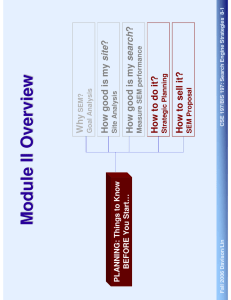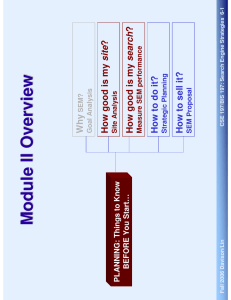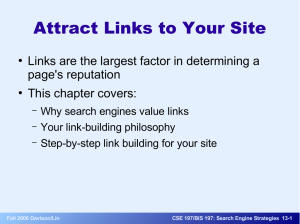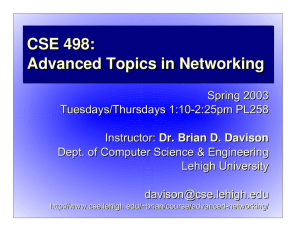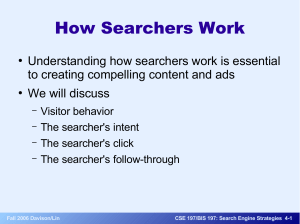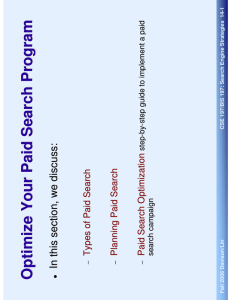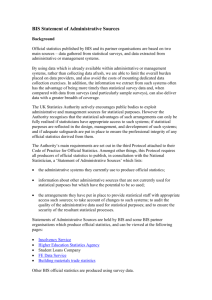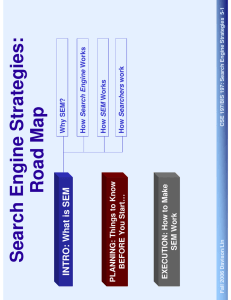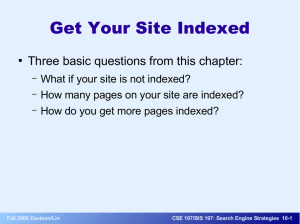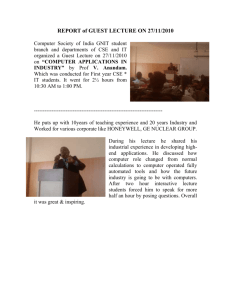w ie rv e
advertisement
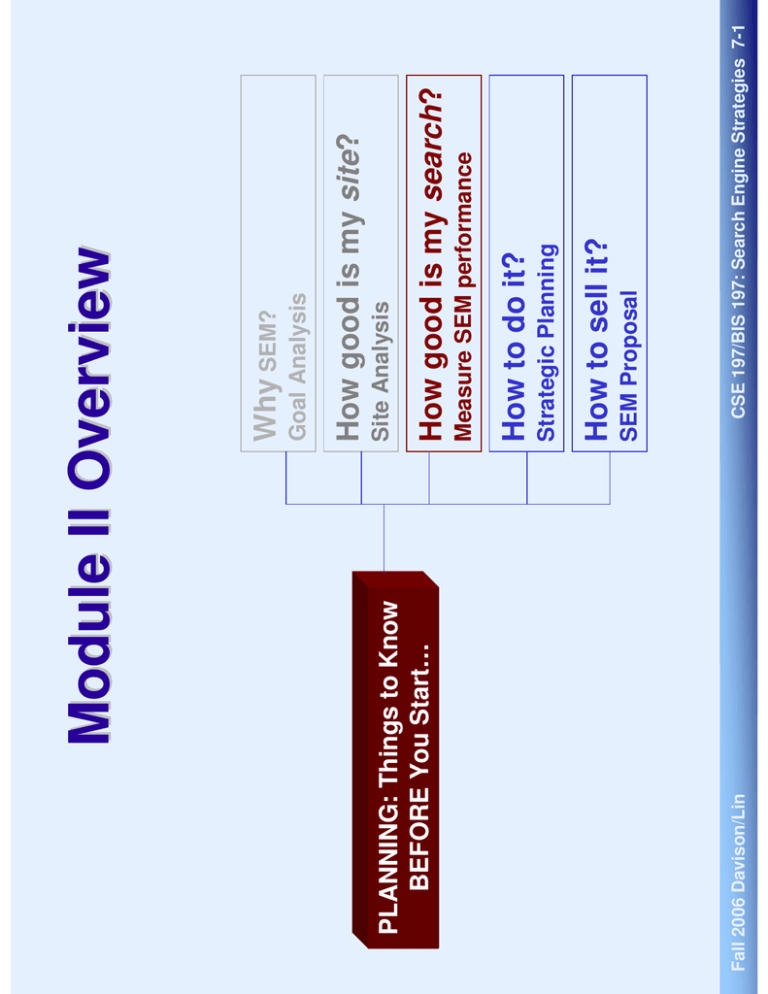
Fall 2006 Davison/Lin PLANNING: Things to Know BEFORE You Start… CSE 197/BIS 197: Search Engine Strategies 7-1 SEM Proposal How to sell it? Strategic Planning How to do it? Measure SEM performance How good is my search? Site Analysis How good is my site? Goal Analysis Why SEM? Module II Overview You are trying to attract customers to “buy” You are competing with other companies for “business” − − − − CSE 197/BIS 197: Search Engine Strategies 7-2 Current Market analysis: size, major players, market share… Product differentiation: what makes your product so unique? Entering a new market: key considerations You are “selling” your web sites − Launching a SEM campaign is similar to entering a new market Fall 2006 Davison/Lin Measure Your Search Opportunity Current Market analysis Calculate your opportunity − CSE 197/BIS 197: Search Engine Strategies 7-3 Target your campaign (Product differentiation): what makes your site so unique? − − Launching a SEM campaign: key considerations Fall 2006 Davison/Lin Measure Your Search Opportunity Measurement Simple Practical − − − Selection Tools Selection Process − − Choose your target keyword Profile − Choose your target area Fall 2006 Davison/Lin CSE 197/BIS 197: Search Engine Strategies 7-4 Task 1: Target Your Campaign The search result can only start with one area − − Goal defines your target area CSE 197/BIS 197: Search Engine Strategies 7-5 Different purposes / business models − Rule #1: Remember your goal Different pages − Remember, you have a web site! Fall 2006 Davison/Lin Task 1.1: Choose Target Area Measurable business impact Simple… to measure and to operationalize Practical… to manage − − − CSE 197/BIS 197: Search Engine Strategies 7-6 High profile − Choosing the right area: Fall 2006 Davison/Lin Task 1.1: Choose Target Area Drop irrelevant keywords Beware: the most popular keyword! Beware: your brand! Focus on the “niche”: medium-popularity keywords with sufficient traffic − − − − CSE 197/BIS 197: Search Engine Strategies 7-7 Drop competitors’ keywords − Step 3: “Market” analysis Fall 2006 Davison/Lin Google AdWords keyword tool − Step 2: Use keyword selection tools to find the stats. Yahoo (overture) Keyword selection tool Step 1: Find an intuitive keyword to start − Will cover details in Chapter 11, we focus on the basics for now Task 1.2: Choose Target Keyword − − − − CSE 197/BIS 197: Search Engine Strategies 7-8 Generic name: ? Ranking, ? traffic Come up with seven to ten phrases your brand name and a generic category name should be there Brand name: ? ranking, ? Traffic General Strategy Fall 2006 Davison/Lin Task 1.2: Choose Target Keyword − − − − What is your landing page? Is your landing page indexed? Your traffic Your ranking Competitor ranking Landing page analysis CSE 197/BIS 197: Search Engine Strategies 7-9 Measure current performance Fall 2006 Davison/Lin Task 2: Assess Your Current Situation Banner ad landing page is more dynamic Designed to reinforce the searcher's intent Very important for site lock-in − CSE 197/BIS 197: Search Engine Strategies 7-10 Most important: make sure the content matches and reinforces the link description Landing page design − − − Landing Page: the place on your Web site visitors will go when they click a particular banner ad / link Fall 2006 Davison/Lin 2.1: Landing Page Might reveal problems with your current site indexed Use special inclusion operators to see if your page is − − CSE 197/BIS 197: Search Engine Strategies 7-11 87% of the searchers click on a top-ten link 60% of them click on organic links www.digitalpoint.com/tools/keywords appearing in the top ten of organic results is clearly the place to be Landing Page: rank? − − Landing Page: indexed? Fall 2006 Davison/Lin 2.1: Landing Page Your Ranking Fall 2006 Davison/Lin CSE 197/BIS 197: Search Engine Strategies 7-12 2.2: Your Ranking − − CSE 197/BIS 197: Search Engine Strategies 7-13 Every page that you get into the top ten pushes your competition down further Where are your competitors? Competitor Ranking Fall 2006 Davison/Lin 2.3: Competitor Ranking − http://www.google.com/search? sourceid=navclient&ie= UTF-8&oe=UTF-8&q=digital+camera CSE 197/BIS 197: Search Engine Strategies 7-14 What keyword do they use to find you? How many people visit your web site? How many are referred from search engine sites? Web log: − − − Your traffic Fall 2006 Davison/Lin 2.4: Your Traffic Missed opportunities Future traffic Future revenue Fall 2006 Davison/Lin Keyword Demand CSE 197/BIS 197: Search Engine Strategies 7-15 Task 3: Calculate Your Opportunities CSE 197/BIS 197: Search Engine Strategies 7-16 Multiplying the Yahoo! total by 2.2 yields a relatively accurate number of total worldwide searches in the major search engines [ch. 11] Keyword Demand: The number of searches for any particular query Fall 2006 Davison/Lin 3.1: Keyword Demand Missed Opportunity Matrix Fall 2006 Davison/Lin CSE 197/BIS 197: Search Engine Strategies 7-17 3.2: Missed Opportunity 60% of the clicks are organic Searchers click 1.8 to 2.8 links − − − CSE 197/BIS 197: Search Engine Strategies 7-18 What about paid placement? 5% is normal For every 100 searches, about ? Clicks on the first page 48% searchers click on links on the first page − Number crunching that can be achieved after a successful first search marketing campaign Key question: how to estimate the reasonable number of clicks Fall 2006 Davison/Lin 3.3: Future Traffic − Add in a distribution assumption CSE 197/BIS 197: Search Engine Strategies 7-19 For every 100 searches, about 52 Clicks on the first page Fall 2006 Davison/Lin 3.3: Future Traffic − Add in a distribution assumption CSE 197/BIS 197: Search Engine Strategies 7-20 For every 100 searches, about 52 Clicks on the first page Fall 2006 Davison/Lin 3.3: Future Traffic − How likely: projected-rankings matrix CSE 197/BIS 197: Search Engine Strategies 7-21 Now we know the click-through rate if we are top-10 Fall 2006 Davison/Lin 3.3: Future Traffic Putting things together: Fall 2006 Davison/Lin CSE 197/BIS 197: Search Engine Strategies 7-22 3.3: Future Traffic − We need? CSE 197/BIS 197: Search Engine Strategies 7-23 We have the future visit number (traffic) Fall 2006 Davison/Lin 3.4: Future Revenue Fall 2006 Davison/Lin CSE 197/BIS 197: Search Engine Strategies 7-24 Summary
